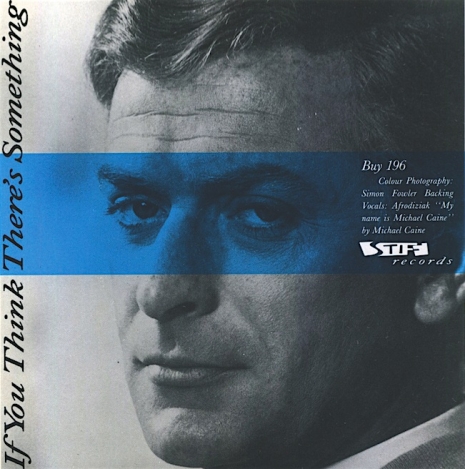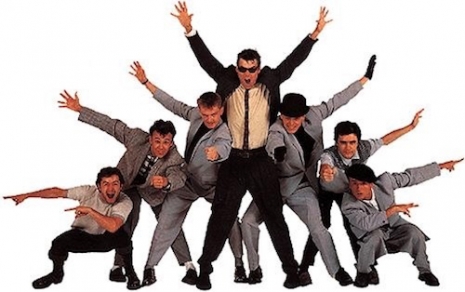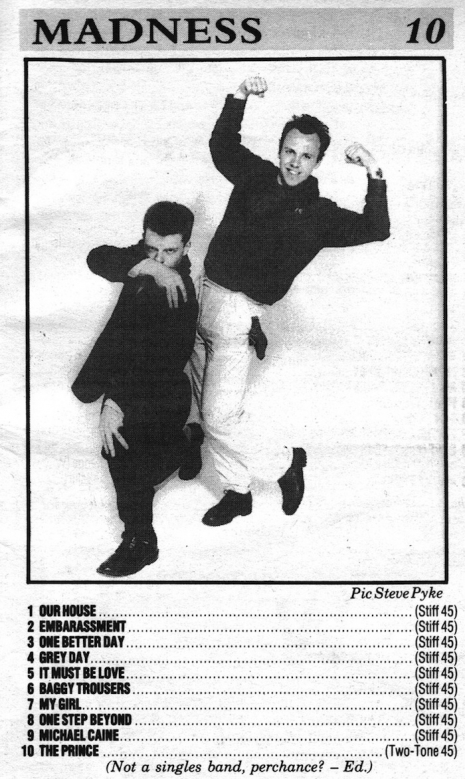
Apparently, the easiest way to improve your Michael Caine impersonation is to say:
My name, is my cocaine.
See. It works.
Now, Peter Sellers used to do a superb Michael Caine impression which began something like that and then going on to detail some utterly trivial boring fact (a bit like the one above…) before finishing, “Not a lot people know that.”
“Not a lot of people know that…” became the catchphrase most associated with Caine though he never actually said it. However, the great movie star did say “My name is Michael Caine” for a top ten chart hit by band Madness in 1984.
Anyone who has seen Caine’s stellar performance in the movie Little Voice will know that he is not the world’s greatest singer. Thankfully no singing was required with the song “Michael Caine.” When first approached by London’s nutty boys Madness to add his voice to their single, the great actor knocked it back. But then he had a change of heart as he explained to William Orbit in 2007:
My daughter, who was 10 at the time, said: ‘You’ve got to do it, dad, it’s Madness!’ I did it for her.

Caine as he appeared on the back cover of the single ‘Michael Caine’ by Madness.
Written by Madness sometime vocalist and trumpeter Carl Smyth (aka Chas Smash) and drummer Daniel Woodgate “Michael Caine” might at a first listen sound like some strange hybrid pop song about spies and celebrity and wanting a photograph or something or other. But the song is actually far more complex than its catchy little tune suggests.
I recall it was the NME that first highlighted the deeper (darker) significance of the song “Michael Caine” in its inky black pages. The NME revealed Madness’ eighteenth single was in fact about an IRA informer “forced to live under an assumed name.” When the strain becomes too great for this unlucky chap—he “cracks under the pressure” and all he has as a reminder of his past life is a photograph.
The lyrics are certainly oblique enough to disguise any direct correlation between a world class movie actor, spying, the IRA and “The Troubles”—which was the rather twee term used to describe the war in Northern Ireland between 1968 and 1998. Anyhow, the lyrics go as follows:
He’s walking where I’m afraid I don’t know
I see the firemen jumping from the windows
There’s panic and I hear somebody screamHe picks up useless paper
And puts it in my pocket
I’m trying very hard to keep my fingers clean
I can’t remember tell me what’s his nameAnd all I wanted was a word or photograph to keep at home
And all I wanted was a word or photograph to keepThe sun is laughing its another broken morning
I see a shadow and call out to try and warn him
He didn’t seem to hear
Just turned awayThe quiet fellow follows and points his fingers
Straight at you
He had to sacrifice his pride yes throw it all awayHis days are numbered he walks round and round in circles
There is no place he can ever call his own
He seems to jump at the sound of the phoneStaring out the window there’s nothing he can now do
All he wanted was to remain sane
He can’t remember his own name

Madness.
It’s obvious from these lyrics the song’s about something nasty in the woodshed. But wait—this was Madness who weren’t exactly known for putting out deep political songs. They were considered “a singles band” which was greatly unfair considering the magnificence of their fourth studio album The Rise & Fall—which is to be frank is their Sgt. Pepper moment—a literal classic. But yes, Madness was seen as a jolly, happy, fun bunch of guys whose ska-influenced music was deeply joyous entertainment.
But then again “Michael Caine” wasn’t the band’s first foray into politics.
On The Rise & Fall, Madness put out a track called “Blue Skinned Beast” which was a satirical blast against then prime minister Margaret Thatcher and the Conservative government’s handling of the Falklands War. It seemed that in an effort to appear more grown-up, more sophisticated, Madness tapped into the political zeitgeist influencing many other bands at the time. In truth, they didn’t need to. Their music was best when it was autobiographical, happily generic and fun.

Madness, a singles band? Never.
It is highly unlikely that the Conservative-supporting Sir Michael Caine knew about the political association of this single—it was (shurely?) just a bit of fun by those nutty boys his daughter liked. If he had known of the underlying subtext, I doubt one of England’s greatest movie stars would have contributed his voice—especially as the song came out the same year the IRA tried to murder Margaret Thatcher by blowing-up the hotel in which she was staying during the Conservative party conference.
The video for “Michael Caine” opens with an impression of (who else?) Michael Caine and the words:
If there’s one thing worse than a murderer—it’s a dirty, rotten, stinking grass…
This tees-up a homage to Caine’s Harry Palmer movies—in particular The Ipcress File. Unlike most Madness songs, Chas Smash takes over lead vocal from Suggs—and there’s some nice harmonizing backing vocals from Afrodiziak.